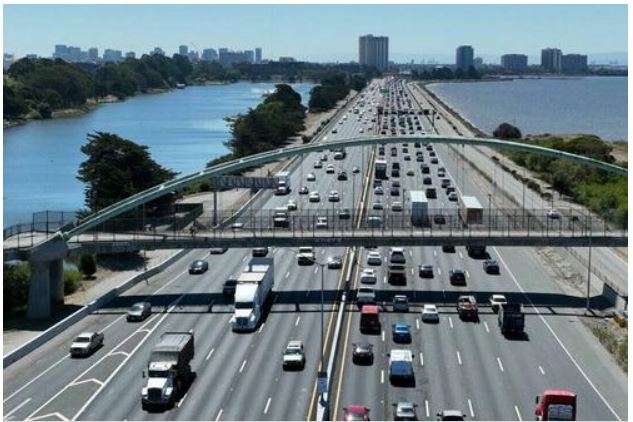Authored by Christian Milord via The Epoch Times (emphasis ours),
The recent stringent Environmental Protection Agency’s (EPA) carbon emissions standards for internal combustion engines defy economic realities. The EPA would have us believe that coercing folks to buy electric vehicles (EV) will somehow reduce alleged climate change extremes. The new rules will negatively affect California and the entire nation.
Obviously, most folks want to maintain clean air, land, and water ecosystems. However, scientists haven’t agreed on what degree human activity adversely impacts global climate change as opposed to natural causes for extreme climate events. Several dire predictions of rising seas haven’t panned out over several decades, while cooling and warming trends haven’t been too much out of the ordinary.
The new EPA standards are part of a government plan to make EVs two-thirds of new car sales by 2032. Thirty percent of heavy duty commercial vehicles have to be emissions-free by 2032 and 40 percent of short-haul trucks by the same time frame. Emission particulates must be reduced to nine micrograms for each cubic meter of exhaust. Spokespersons from the American Petroleum Institute stated that the new regulation “threatens consumer freedom, energy reliability and national security.”
These EPA goals are unlikely to eventuate due to several factors. First, Americans bristle when they are pressured into purchasing products that haven’t proven their worth over an extended period of time. Electric vehicles can be expensive and heavy due to large batteries that are costly to repair when they break down. They take too long to charge up when contrasted with diesel or gas refilling times. How will the grid handle millions of EVs when it can’t even cope with current electricity demands?
Next, electric vehicles lose power in wintry weather, thus increasing the already existent range anxiety. What if an owner needs to charge up the vehicle and the charger doesn’t work at a chosen location, or it has an incompatible charger? Moreover, owners must keep in mind that criminals cut charger cables for the materials, something they aren’t tempted to do at diesel or gasoline filling stations.
The car rental company Hertz learned a hard lesson when it purchased a fleet of EVs and hardly anyone wanted to rent them for reasons already noted. Hertz is now trying to sell 20,000 of these vehicles and adding back gasoline-powered cars. Other car rental companies will likely see the writing on the wall and follow suit. A similar scenario is unfolding with some bus and van companies as well.
Third, purchasing these vehicles benefits China, because the PRC controls most of the rare earth minerals that go into batteries, as well as the lithium battery industry. Products that are manufactured in China might have questionable quality control standards as they move through the production process. How reliable are these heavy batteries, and how often do they catch on fire? It is unwise to surrender critical facets of our national and technological security to the Chinese Communist Party (CCP).
Fourth, mandating a rapid transition to EVs puts government policies way ahead of actual innovation in the free market. Consumers want choices when it comes to making big purchases, and if they want an EV or hybrid vehicle that’s fine, but buying an internal combustion vehicle ought to be an option, too. With decreasing options, the costs of energy will skyrocket and healthy competition will be stifled.
Fifth, although the new EPA guidelines would further reduce carbon emissions, the earth needs these emissions because plants turn CO2 into oxygen. Furthermore, climate alarmists ignore the fact that fossil fuel emissions have become much cleaner over the last four or five decades due to catalytic converters and pollution controls on industry. Extracting and refining fossil fuels have undergone a purer process.
Sixth, has the EPA thought about the pollution generated by the recycling of large batteries, car bodies, solar panels, and wind turbines? Fossil fuel energy will be needed to carry out this process, just as oil products keep the electric grid in operation. Solar and wind power are unreliable sources of energy and would result in brownouts and power shortages if petroleum products are left out of the energy equation.
Seventh, do government officials and well-heeled climate “progressives” truly believe what they are preaching? Most of them have fine cars, big homes, and they jet around the world leaving a huge carbon footprint in their wake. Their hypocrisy is staggering as they attempt to impose a minimalist lifestyle on other Americans while they live the high life. They don’t have to face the repercussions of their shortsighted mandates, yet they want the masses to regress back to a pre-industrial stage of existence.
Finally, America has plentiful supplies of natural gas and petroleum that could last more than a century. Transitioning to an emissions-free society will take several decades if it happens at all. Until then, cleaner and reliable fuel sources will be in constant demand to drive a modern economy and lift people out of poverty. Indeed, energy autonomy is a crucial aspect of economic, informational, and national security.
